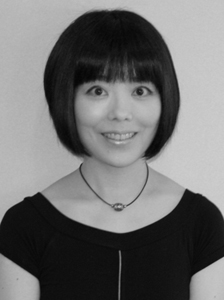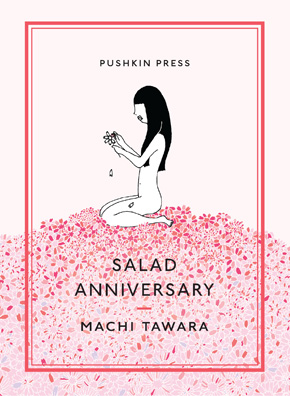Pretending to wait for someone
by Machi TawaraWanting to be Tinkerbell
and take you in my arms—
pearly pink flat shoes
After seeing you off this morning,
I glance at my toothpaste tube—
the dent in it is new
Sharing in the sun with you
summer’s first tomato,
skin firm yet delicate
He loved another first—
and so I am cast as
the ‘other-woman type’
“Marry a nice guy, now”
says this guy, with a kiss,
and doesn’t marry me
Each having someone waiting,
you and I talk lightly of baseball,
and part in the afternoon
“Here” you say and hand me the ring
“Thanks” I say and take it
like a piece of candy
Evening—
this man who’s leaving me
earnestly takes my picture
As I weep, another me
marvels at my weeping—
quietly, love draws to an end
Farewell scene:
do cooling passions
flare up a little at the end?
You and I under the full moon
groping for answers—
like a game of blindman’s bluff
Dawn breaks in Tokyo;
at a vending machine in a corner of town,
buying two cans of Coke
As I gaze skyward it floats in my mind—
the name of the girl
who’s probably seeing you off
On a hill west of the capital,
where I came once before,
I wave to the Sunshine Building
Holding a daisy high in the air,
both hands around its neck,
I ask “Who do you love best?”
The ancient maiden Sano no Chigami:
to her was granted
the pain of waiting
Slow-motion walk, alone,
through this land that boasts the gentle word natanezuyu.
rain at rape-blossom time
I boil three chestnuts
to make an autumn for one—
remembering the far-off sea, and you
Voice lowered to a whisper
the pavement fortune-teller confides,
“I see signs of marriage ahead”
Autumn night, wanting a small romance—
parsley on the veranda
turning slightly yellow
On the table
I keep a small coconut palm
for my solitary mornings
Won’t ease my sighing, I know,
but I try slicing
the ham a bit thicker
Early morning,
cyclamen flowers standing erect—
if only I could see with their eyes
Memories—
like a package of mixed vegetables
that mustn’t be defrosted
Unable to follow after someone
leaving on a journey at a whim—
my life goes on as usual
The wonder of it—
a bit of love rests on my palm
after crossing the ocean airmail
Loneliness of being in love
in December—
my heart impervious to “Jingle Bells”
Even dressed up like an antique doll
some of life’s mud
cannot be concealed
To pass a day with nothing to do
I play a solitary game:
‘pretending to wait for someone’
What sad and weeping voice is that?
Turn and see
steam rising from the rice cooker
Nineteen eighty-five, the year I fell in love,
winds to an end—
in my room, just me and my dieffenbachia
“The crocuses are out”
Suddenly I want to write a letter
opening with those words
Looking at a postcard
from a country of primary colors—
like the sequel to a dream
On the terrace, red with sunrise,
the fern puts out new fronds
to mark the coming of spring
On my table, coffee aroma so rich—
to think of living
with nothing but love!
From the collection Salad Anniversary, translated by Juliet Winters Carpenter.
 Machi Tawara was a 25-year-old high-school teacher when her first collection of poetry, now published in English for the first time as Salad Anniversary, took Japan by storm in 1987. Her deceptively simple poems mix the ancient formal grace of tanka with modern wit and insight as she writes about lost and new loves, life in Tokyo and travels in China. The collection inspired televised serial dramas, a musical revue and a full-length movie, and went on to sell 8 million copies worldwide. She has been awarded multiple prizes for her poetry, including the Kadokawa Tanka Award and the Modern Japanese Poets Association Award. Tawara is also a critic, translator and travel writer, and contributes to various national newspapers and magazines. Salad Anniversary is published by Pushkin Press. Read more.
Machi Tawara was a 25-year-old high-school teacher when her first collection of poetry, now published in English for the first time as Salad Anniversary, took Japan by storm in 1987. Her deceptively simple poems mix the ancient formal grace of tanka with modern wit and insight as she writes about lost and new loves, life in Tokyo and travels in China. The collection inspired televised serial dramas, a musical revue and a full-length movie, and went on to sell 8 million copies worldwide. She has been awarded multiple prizes for her poetry, including the Kadokawa Tanka Award and the Modern Japanese Poets Association Award. Tawara is also a critic, translator and travel writer, and contributes to various national newspapers and magazines. Salad Anniversary is published by Pushkin Press. Read more.
Juliet Winters Carpenter is an award-winning translator of modern Japanese literature. Her translation of Kobo Abe’s Secret Rendezvous was awarded the 1980 Japan–US Friendship Commission Prize, and her translation of Minae Mizumura’s A True Novel won the 2014 Next Generation Indie Book Award’s Grand Prize in Fiction and the American Translators Association’s Lewis Galantière Award. She lives in Kyoto, where she is a professor at the Doshisha Women’s College of Liberal Arts.


